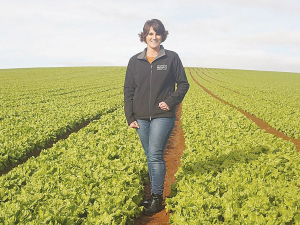M.I.A.
OPINION: The previous government spent too much during the Covid-19 pandemic, despite warnings from officials, according to a briefing released by the Treasury.
 Pukekohe Vegetable Growers Association president Kylie Faulkner says growers are looking at possible scenarios and how they may deal with it.
Pukekohe Vegetable Growers Association president Kylie Faulkner says growers are looking at possible scenarios and how they may deal with it.
Vegetable growers in South Auckland are bracing for Omicron and making contingency plans to deal with the fallout.
Pukekohe Vegetable Growers Association (PVGA) president Kylie Faulkner says growers are looking at possible scenarios and how they may deal with it.
"There is no simple answer and all no businesses plans would be the same," she told Rural News.
"This may mean issues with supply at the time of an outbreak or possibly further down the track - like impact of possibly not being able to plant seedlings."
Faulkner says like other growers, PVGA members are also feeling the brunt of Covid.
"Covid has caused additional pressure on all primary producers. For members it is around managing the safety of our staff, working in bubbles, pressures of working in lockdowns and border controls in and out of Auckland.
"We are now entering our third year of this."
On top of Covid, labour shortage remains an ongoing issue.
"I don't see this getting any better, any time soon," says Faulkner.
Potatoes NZ says it is following government guidelines and sharing all relevant information such as planning for infection on farm, where to find RATs and critical worker registration with its members.
PNZ spokeswoman Gemma Carroll says so far there have been no reports of any major disruption in the potato sector.
She says harvesting is continuing.
"We hope there are no disruptions. Time will tell," she told Rural News.
She says the last spring and summer delivered a mixed bag of weather; a couple of rain events challenged growers in Horowhenua and Canterbury.
In Pukekohe, south of Auckland, early crops were hit by wind, but pre-spring moisture was good.
Then in late November-December the big dry has hit, says Carroll.
"Irrigation is generally very challenging, with growers needing to constantly move equipment from paddock to paddock.
"The blocks here are smaller and the terrain too undulating, for pivots. Irrigation guns are a highly efficient use of water but they're about all the industry use here at present,"
In Canterbury a huge deluge before Christmas meant some disruption for late plantings and some crop loss.
"The big rain affected the normal petiole range and this has meant unrestricted canopy growth.
"Canterbury is lucky to have irrigation schemes. The otherwise dry weather has been managed with irrigation," she says.
Agrisea NZ has appointed Craig Hudson as it's new chief growth officer.
State farmer Landcorp, trading as Pamu, is a forecasting a full-year net profit of around $100 million.
Tony Aitken, chief executive of Ruralco, has been awarded the Excellence in Business Leadership Award at the ANZ Business of the Year Awards.
Global trade has been thrown into another bout of uncertainty following the overnight ruling by US Supreme Court, striking down President Donald Trump's decision to impose additional tariffs on trading partners.
Controls on the movement of fruit and vegetables in the Auckland suburb of Mt Roskill have been lifted.
Fonterra farmer shareholders and unit holders are in line for another payment in April.

OPINION: Here w go: the election date is set for November 7 and the politicians are out of the gate…
OPINION: ECan data was released a few days ago showing Canterbury farmers have made “giant strides on environmental performance”.